The Portable William Blake (66 page)
Read The Portable William Blake Online
Authors: William Blake

In the No. of the
Gents. Magaxine
for last Jan. there is a letter by Cromek to Blake printed in order to convict Blake of selfishness. It cannot possibly be substantially true. I may elsewhere notice it.
Gents. Magaxine
for last Jan. there is a letter by Cromek to Blake printed in order to convict Blake of selfishness. It cannot possibly be substantially true. I may elsewhere notice it.
13th June
. I saw him again in June. He was as wild as ever, says my journal, but he was led to-day to make assertions more palpably mischievous, if capable of influencing other minds, and immoral, supposing them to express the will of a responsible agent, than anything he had said before. As, for instance, that he had learned from the Bible that Wives should be in common. And when I objected that marriage was a Divine institution, he referred to the Bible—“that from the beginning it was not so.” He affirmed that he had committed many murders, and repeated his doctrine, that reason is the only sin, and that careless, gay people are better than those who think, etc. etc.
. I saw him again in June. He was as wild as ever, says my journal, but he was led to-day to make assertions more palpably mischievous, if capable of influencing other minds, and immoral, supposing them to express the will of a responsible agent, than anything he had said before. As, for instance, that he had learned from the Bible that Wives should be in common. And when I objected that marriage was a Divine institution, he referred to the Bible—“that from the beginning it was not so.” He affirmed that he had committed many murders, and repeated his doctrine, that reason is the only sin, and that careless, gay people are better than those who think, etc. etc.
It was, I believe, on the 7th of December that I saw him last. I had just heard of the death of Flaxman, a man whom he professed to admire, and was curious to know how he would receive the intelligence. It was as I expected. He had been ill during the summer, and he said with a smile, “I thought I should have gone first:, He then said, ”I cannot think of death as more than the going out of one room into another.” And Flaxman was no longer thought of. He relapsed into his ordinary train of thinking. Indeed I had by this time learned that there was nothing to be gained by frequent intercourse. And therefore it was that after this interview I was not anxious to be frequent in my visits. This day he said, ”Men are born with an Angel and a Devil.” This he himself interpreted as Soul and Body, and as I have long since said of the strange sayings of a man who enjoys a high reputation, ”it is more in the language than the thought that this singularity is to be looked for.” And this day he spoke of the Old Testament as if [it] were the evil element. Christ, he said, took much after his mother, and in so far was one of the worst of men. On my asking him for an instance, he referred to his turning the money-changers out of the Temple—he had no right to do that. He digressed into a condemnation of those who sit in judgement on others. ”I have never known a very bad man who had not something very good about him.”
Speaking of the Atonement in the ordinary Calvinistic sense, he said, “It is a horrible doctrine; if another pay your debt, I do not forgive it.”
I have no account of any other call—but there is probably an omission. I took Götzenberger to see him, and he met the Masqueriers in my chambers. Masquerier was not the man to meet him. He could not humour Blake nor understand the peculiar sense in which he was to be received.
1827
My journal of this year contains nothing about Blake. But in January 1828 Barron Field and myself called on Mrs. Blake. The poor old lady was more affected than I expected she would be at the sight of me. She spoke of her husband as dying like an angel. She informed me that she was going to live with Linnell as his housekeeper. And we understood that she would live with him, and he, as it were, to farm her services and take all she had. The engravings of Job were his already. Chaucer’s “Canterbury Pilgrims” were hers. I took two copies—one I gave to C. Lamb. Barron Field took a proof.
Mrs. Blake died within a few years, and since Blake’s death Linnell has not found the market I took for granted he would seek for Blake’s works. Wilkinson printed a small edition of his poems, including the “Songs of Innocence and Experience,” a few years ago, and Monkton Mylne talks of printing an edition. I have a few coloured engravings—but Blake is still an object of interest exclusively to men of imaginative taste and psychological curiosity. I doubt much whether these mems. will be of any use to this small class. I have been reading since the Life of Blake by Allan Cuningham, vol. ii. p. 143 of his Lives of the Painters. It recognises more perhaps of Blake’s merit than might be expected of a
Scotch
realist.
Scotch
realist.
BLAKE CHRONOLOGY
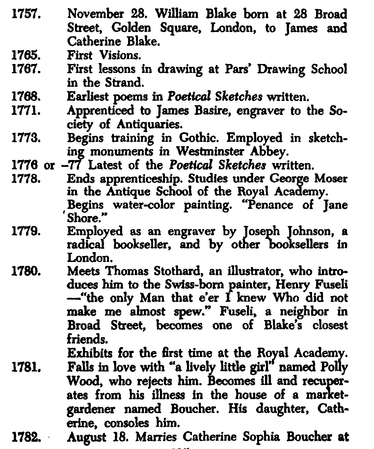
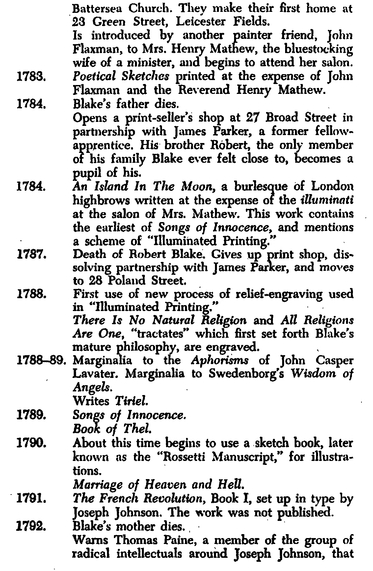
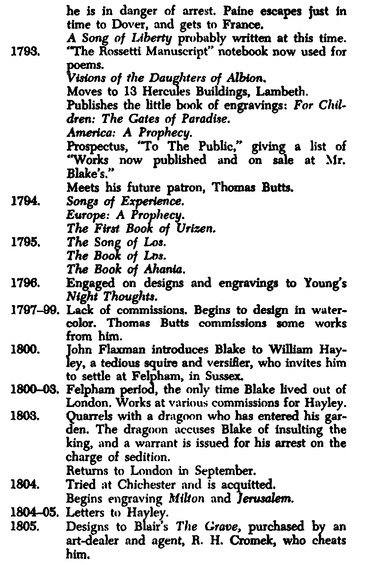
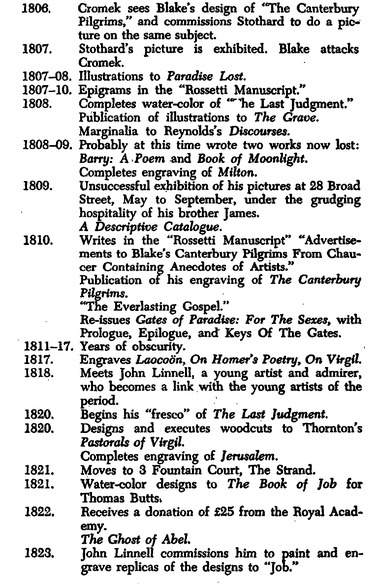
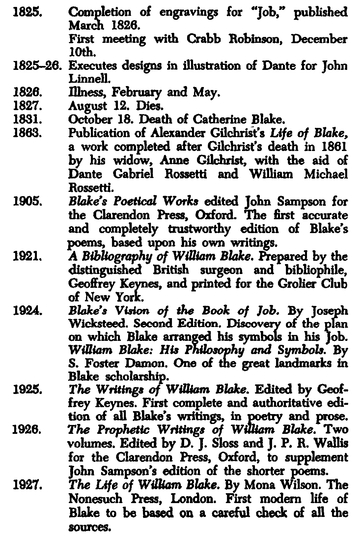
BIBLIOGRAPHY
The Complete Writings of William Blake,
ed. Geoffrey, Keynes
.
London and New York, 1957; rev. ed., 1966. The standard text, with variant readings.
ed. Geoffrey, Keynes
.
London and New York, 1957; rev. ed., 1966. The standard text, with variant readings.
The Poetry and
Prose
of
William Blake,
ed. David V. Erdman and Harold Bloom. New York, 1965. A scholarly text, with Blake’s original punctuation, full textual notes, and critical commentary.
Prose
of
William Blake,
ed. David V. Erdman and Harold Bloom. New York, 1965. A scholarly text, with Blake’s original punctuation, full textual notes, and critical commentary.
Blake Trust Facsimiles. London.
Jerusalem,
1951 (black and white, 1952); Songs of Innocence, 1954;
Songs of Innocence and Experience,
1955;
The Book of Urizen,
1958;
Visions of
the
Daughters of Albion.
1959;
The Marriage of Heaven and Hell
,
1960;
America,
1963;
The Book of Thel,
1965;
Milton,
1967. Superb color reproductions. invaluable for study of the poems.
Jerusalem,
1951 (black and white, 1952); Songs of Innocence, 1954;
Songs of Innocence and Experience,
1955;
The Book of Urizen,
1958;
Visions of
the
Daughters of Albion.
1959;
The Marriage of Heaven and Hell
,
1960;
America,
1963;
The Book of Thel,
1965;
Milton,
1967. Superb color reproductions. invaluable for study of the poems.
Bentley, C. E., Jr., and Martin K. Nurmi.
A Blake Bibliography.
Minneapolis, Minn., 1964; London, 1965.
A Blake Bibliography.
Minneapolis, Minn., 1964; London, 1965.
Gilchrist, Alexander.
The Life of William Blake, Piclor Ignotus,
ed. Ruthven Todd. London and New York, 1945. Everyman’s Library. The earliest (1863) and still the most important biography
The Life of William Blake, Piclor Ignotus,
ed. Ruthven Todd. London and New York, 1945. Everyman’s Library. The earliest (1863) and still the most important biography
Wilson, Mona.
The Life of William Blake.
London, 1927; rev. ed., 1948. The standard modern biography.
The Life of William Blake.
London, 1927; rev. ed., 1948. The standard modern biography.
Binyon, Laurence.
The Drawings and Engravings of William Blake.
London, 1922.
The Drawings and Engravings of William Blake.
London, 1922.
Damon, S. Foster.
William Blake’s Illustrations
of
the
Book
of Job.
Providence, R.I., 1966.
William Blake’s Illustrations
of
the
Book
of Job.
Providence, R.I., 1966.
Figgis, Darrell.
The Paintings of William Blake
London, 1925.
The Paintings of William Blake
London, 1925.
Blunt. Anthony.
The Art of William Blake.
New York and London, 1959.
The Art of William Blake.
New York and London, 1959.
Digby, George Wingfield.
Symbol and Image in William Blake.
Oxford, 1957.
Symbol and Image in William Blake.
Oxford, 1957.
Hagstrum, Jean 11.
William Blake
,
Poet and Painter: An Introduction to the Illuminated Verse.
Chicago and London, 1964.
William Blake
,
Poet and Painter: An Introduction to the Illuminated Verse.
Chicago and London, 1964.
Roe, Albert S.
Blake’s Illustrations to the Divine Comedy.
Princeton, N.J., and London, 1953.
Blake’s Illustrations to the Divine Comedy.
Princeton, N.J., and London, 1953.
Wicksteed, joseph H.
Blake’s Vision of the Book of Job.
London, 1910; rev. ed., 1924.
Blake’s Vision of the Book of Job.
London, 1910; rev. ed., 1924.
Adams, Hazard.
William Blake: A Reading of the Shorter Poems.
Seattle, Wash., 1963.
William Blake: A Reading of the Shorter Poems.
Seattle, Wash., 1963.
Blackstone, Bernard.
English Blake.
Cambridge, 1949. A study of the eighteenth-century intellectual background.
English Blake.
Cambridge, 1949. A study of the eighteenth-century intellectual background.
Bloom, Harold. Blake’s
Apocalypse.
New York and London. 1963. A close reading of the Prophetic Books.
Apocalypse.
New York and London. 1963. A close reading of the Prophetic Books.
Bronowski, Jacob.
William Blake and the Age of Revolution.
New York, 1965. Revision of A
Man Without
a Mask, 1943. Illaminating on the social and political background.
William Blake and the Age of Revolution.
New York, 1965. Revision of A
Man Without
a Mask, 1943. Illaminating on the social and political background.
Damon, S. Foster.
William Blake: His Philosophy and Symbols
. Boston and London, 1924. A monumental work of explication.
William Blake: His Philosophy and Symbols
. Boston and London, 1924. A monumental work of explication.
—A Blake Dictionary
Providence, R.I., 1965.
Providence, R.I., 1965.
Davies, J. G.
The Theology of William Blake.
Oxford, 1948.
The Theology of William Blake.
Oxford, 1948.
Erdman, David V.
Blake: Prophet Against Empire.
Princeton, N.J., and London, 1954. A detailed and illuminating study of the historical background.
Blake: Prophet Against Empire.
Princeton, N.J., and London, 1954. A detailed and illuminating study of the historical background.
Fisher, Peter F.
The Valley of Vision.
Toronto, 1961.
The Valley of Vision.
Toronto, 1961.
Frye, Northrop.
Fearful Symmetry.
Princeton, N.J., and London, 1947. A brilliant study of Blake’s mythology and symbolism.
Fearful Symmetry.
Princeton, N.J., and London, 1947. A brilliant study of Blake’s mythology and symbolism.
—, ed.
William Blake: Modern Essays
in
Criticism.
Englewood Cliffs, N.J and London, 1966.
William Blake: Modern Essays
in
Criticism.
Englewood Cliffs, N.J and London, 1966.
Cardner, Stanley.
Infinity on the Anvil: A Critical Study of Blake’s Poetry.
Oxford, 1964.
Infinity on the Anvil: A Critical Study of Blake’s Poetry.
Oxford, 1964.
Gleckner, Robert F.
The Piper and the Bard.
Detroit, 1959. A close reading of the earlier poems.
The Piper and the Bard.
Detroit, 1959. A close reading of the earlier poems.
Grant, John E., ed.
Discussions of William Blake.
Boston, 1961.
Discussions of William Blake.
Boston, 1961.
Harper, George Mills.
The Neoplatonism of William Blake.
Chapel Hill, N.C.,and London, 1961.
The Neoplatonism of William Blake.
Chapel Hill, N.C.,and London, 1961.
Hirsch, E. D., Jr.
Innocence and Experience: An Introduction to Blake.
New Haven, Conn., and London, 1964.
Innocence and Experience: An Introduction to Blake.
New Haven, Conn., and London, 1964.
Hirst, Désirée.
Hidden Riches. Traditional Symbolism from the Renaissance to Blake.
London, 1964.
Hidden Riches. Traditional Symbolism from the Renaissance to Blake.
London, 1964.
Lowery, Margaret Ruth.
Windows of the Morning.
New Haven, 1940. A study of the
Poetical Sketches.
Windows of the Morning.
New Haven, 1940. A study of the
Poetical Sketches.
Margoliouth, H. M.
William Blake. London,
1951. A good brief introduction.
William Blake. London,
1951. A good brief introduction.
Murry, John Middleton.
William Blake.
London, 1933.
William Blake.
London, 1933.
Nurmi
,
Martin K.
Blake’s “Marriage of Heaven and Hell.”
Kent, Ohio, 1957.
,
Martin K.
Blake’s “Marriage of Heaven and Hell.”
Kent, Ohio, 1957.
Ostriker, Alicia.
Vision and Verse in William Blake.
Madison, Wise., 1965; London, 1966.
Vision and Verse in William Blake.
Madison, Wise., 1965; London, 1966.
Percival, Milton O.
William Blake’s Circle of Destiny.
New York, 1938. A study of occult traditions in Blake.
William Blake’s Circle of Destiny.
New York, 1938. A study of occult traditions in Blake.
Pinto, Vivian de Sola, ed.
The Divine Vision,
London, 1957. A collection of important critical essays.
The Divine Vision,
London, 1957. A collection of important critical essays.
Other books
Woman of Three Worlds by Jeanne Williams
The Mill River Recluse by Darcie Chan
2 The Patchwork Puzzler by Marjory Sorrell Rockwell
Your Number by J. Joseph Wright
Lord Oda's Revenge by Nick Lake
Hot Dog by Laurien Berenson
The Falconer (Elizabeth May) by Elizabeth May
Pirates of the Storm (Stranded In Time Book 1) by Fletcher Best